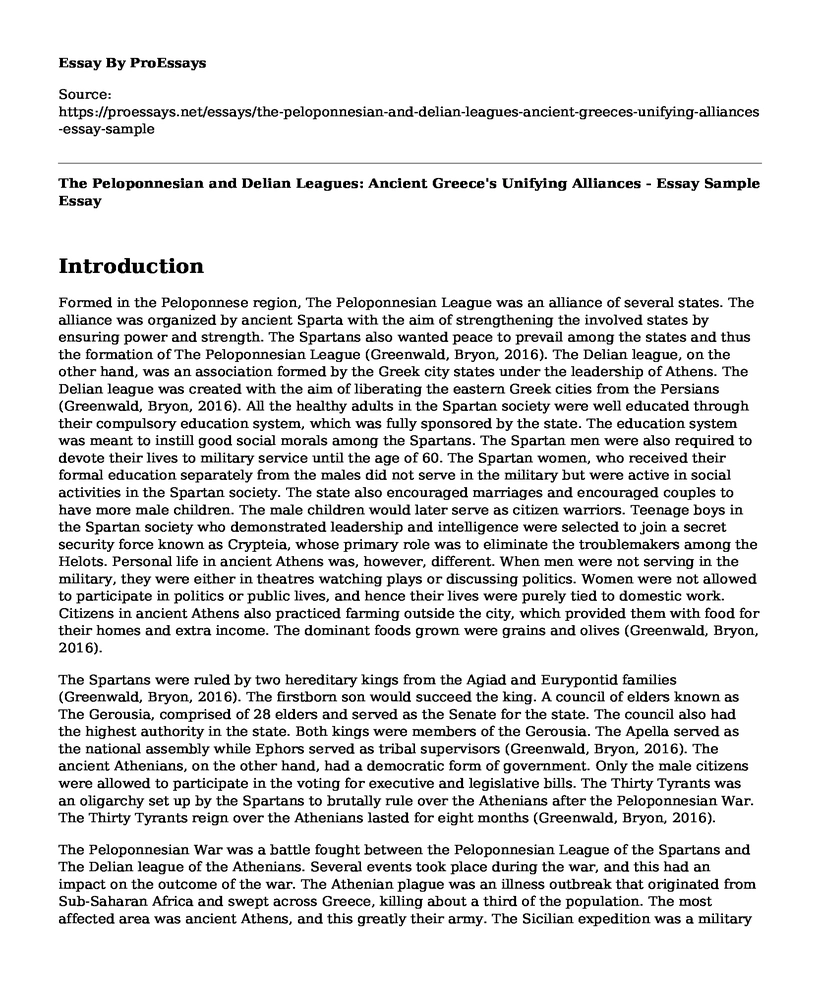Introduction
Formed in the Peloponnese region, The Peloponnesian League was an alliance of several states. The alliance was organized by ancient Sparta with the aim of strengthening the involved states by ensuring power and strength. The Spartans also wanted peace to prevail among the states and thus the formation of The Peloponnesian League (Greenwald, Bryon, 2016). The Delian league, on the other hand, was an association formed by the Greek city states under the leadership of Athens. The Delian league was created with the aim of liberating the eastern Greek cities from the Persians (Greenwald, Bryon, 2016). All the healthy adults in the Spartan society were well educated through their compulsory education system, which was fully sponsored by the state. The education system was meant to instill good social morals among the Spartans. The Spartan men were also required to devote their lives to military service until the age of 60. The Spartan women, who received their formal education separately from the males did not serve in the military but were active in social activities in the Spartan society. The state also encouraged marriages and encouraged couples to have more male children. The male children would later serve as citizen warriors. Teenage boys in the Spartan society who demonstrated leadership and intelligence were selected to join a secret security force known as Crypteia, whose primary role was to eliminate the troublemakers among the Helots. Personal life in ancient Athens was, however, different. When men were not serving in the military, they were either in theatres watching plays or discussing politics. Women were not allowed to participate in politics or public lives, and hence their lives were purely tied to domestic work. Citizens in ancient Athens also practiced farming outside the city, which provided them with food for their homes and extra income. The dominant foods grown were grains and olives (Greenwald, Bryon, 2016).
The Spartans were ruled by two hereditary kings from the Agiad and Eurypontid families (Greenwald, Bryon, 2016). The firstborn son would succeed the king. A council of elders known as The Gerousia, comprised of 28 elders and served as the Senate for the state. The council also had the highest authority in the state. Both kings were members of the Gerousia. The Apella served as the national assembly while Ephors served as tribal supervisors (Greenwald, Bryon, 2016). The ancient Athenians, on the other hand, had a democratic form of government. Only the male citizens were allowed to participate in the voting for executive and legislative bills. The Thirty Tyrants was an oligarchy set up by the Spartans to brutally rule over the Athenians after the Peloponnesian War. The Thirty Tyrants reign over the Athenians lasted for eight months (Greenwald, Bryon, 2016).
The Peloponnesian War was a battle fought between the Peloponnesian League of the Spartans and The Delian league of the Athenians. Several events took place during the war, and this had an impact on the outcome of the war. The Athenian plague was an illness outbreak that originated from Sub-Saharan Africa and swept across Greece, killing about a third of the population. The most affected area was ancient Athens, and this greatly their army. The Sicilian expedition was a military expedition of the Athenian army to Sicily, during the Peloponnesian War against the Spartans (Greenwald, Bryon, 2016). The two events resulted in a defeat of the Athenians, and thus the Spartans took control of the Greek empire. In his funeral, Pericles narrated the benefits of democracy as the method of administration in Ancient Athens. He stated that the Athenian democracy was a unique and special form of governance that did not have to copy from the neighbors and that vested the administrative power on the citizens and not an individual, unlike in the neighborhood. He also stated that the Athenian democracy not only allowed for equal justice among the citizens but also allowed them to elect leaders based on their merit. This made the deaths of the Athenian soldiers nobler than those of the Spartans as the Athenian democracy came into more light and received more admiration from the neighbors, after the Pericles narration at the fallen soldiers' funeral. The Melian dialogue was a negotiation between the Athenian representatives and the Melian representatives in the island of Melos (Wassermann, 1947). The island had remained neutral during the Peloponnesian War and Athenians wanted the Melians to join then and surrender the island to their soldiers. The Melians however could not accept this and in defense they argued that their kin, Spartans would be willing to defend them. The Athenian envoy failed to convince the Melians to join their side and were finally dismissed politely. The use of different approaches to the dialogue by both parties makes it an example of political realism.
References
Greenwald, Bryon. (2016). Thucydides' History of the Peloponnesian War: The Thinking Man's Guide. The Marine Corps gazette. 75-81.
Wassermann, F. (1947). The Melian Dialogue. Transactions and Proceedings of the American Philological Association, 78, 18-36. doi:10.2307/283480
Cite this page
The Peloponnesian and Delian Leagues: Ancient Greece's Unifying Alliances - Essay Sample. (2023, Feb 13). Retrieved from https://proessays.net/essays/the-peloponnesian-and-delian-leagues-ancient-greeces-unifying-alliances-essay-sample
If you are the original author of this essay and no longer wish to have it published on the ProEssays website, please click below to request its removal:
- Gender Roles in Literature Essay
- Speech: The Lives of Isolated and Indigenous People
- Aging Black in America Essay Example
- The Montgomery Bus Protest Essay Example
- Poor Relationships With Law Enforcement - Essay Sample
- Impact of Social Networking Sites: Annotated Bibliography
- Civil War: Outcomes, Decisions, and Historians' Perspectives - Essay Sample







